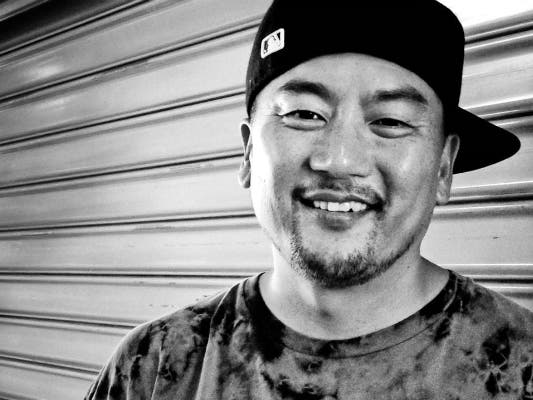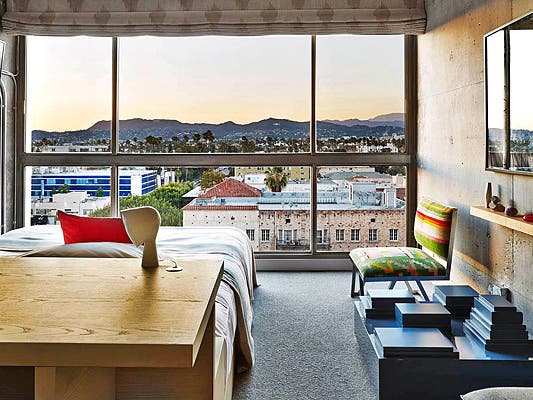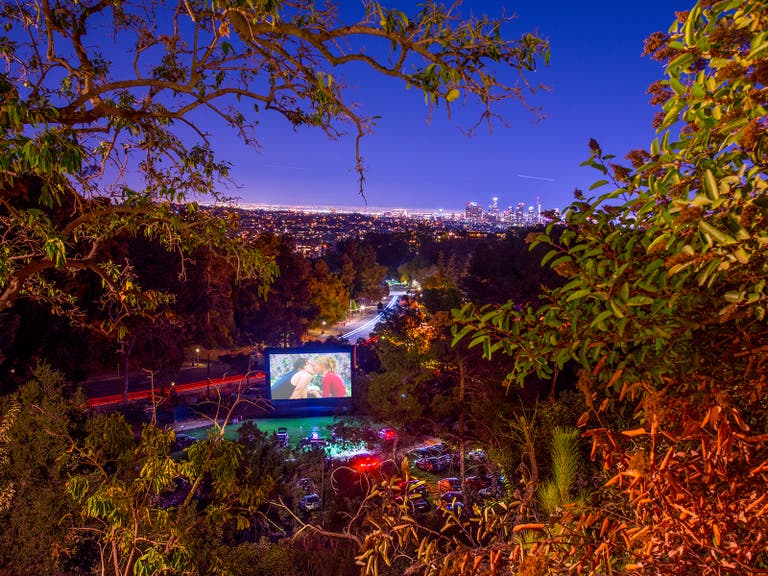L.A. Story Spotlight: Roy Choi

In the introduction to his cookbook/memoir, L.A. Son: My Life, My City, My Food, chef Roy Choi writes, “I had to write this book. To tell the story of my journey from immigrant to latchkey kid to lowrider to misfit to gambler to a chef answering his calling. To tell a story of Los Angeles and the people who live here. And to preserve it all on wax.” Choi first garnered national acclaim as the co-founder of the groundbreaking Kogi BBQ Truck. In the chapter entitled “Windshield,” Choi describes the moment the now-iconic Korean taco was created in a “tiny Koreatown apartment”:
“There it was. Los Angeles on a plate. Maybe it wasn’t everyone’s L.A., but it was mine. It was Koreatown to Melrose to Alvarado to Venice to Crenshaw crumpled into one flavor and bundled up like a gift. The elements looked like city blocks. The flavor tasted like the streets. And the look said home.”
When asked what it is about Los Angeles that made his L.A. story possible, Choi answered succinctly, “Freedom and second chances.” Choi’s advice to young people who want to become chefs is likewise straightforward. “Be OCD about it. F*cking care. Clean as you go. Take notes obsessively. Keep your knife sharp. If you like any of these things above then this is for you.”
Named one of Food & Wine’s “Best New Chefs” in 2010, Roy Choi is one of L.A.’s true culinary ambassadors, from judging a Quickfire Challenge on Top Chef: New Orleans, to his appearances with Anthony Bourdain, including on stage at the Pantages Theatre and at a launch event for L.A. Son, which was published on Bourdain’s Ecco imprint. And in the second episode of the CNN series, Anthony Bourdain Parts Unknown, Choi takes Bourdain on a tour of Koreatown that includes a stop at Beverly Soon Tofu, where the duo discusses Korean American cuisine.
The classically-trained Choi opened his first sit-down restaurant, Chego, in April 2010. The casual eatery was an instant hit, serving “L.A.-in-a-rice bowl” mashups like the Chubby Pork Belly (kochujang-lacquered Kurobuta rice bowl), Sour Cream Hen House (marinated grilled chicken), and “snacks” like Ooey Gooey Fries and 3PM Meatballs. In May 2013, Choi moved Chego from its original Palms location on the Westside, to Chinatown in Downtown L.A.
In November 2010, Choi opened his “modern picnic” concept, A-Frame, in Culver City. The playful, Asian-inflected menu - served in a striking space that formerly housed an IHOP - ranges from furikake kettle corn and sesame leaf-wrapped shrimp tempura, to “Octopi L.A.” (charred octopus) and hoisin chili-glazed baby back ribs. The “Fried Chicken Picnic,” only available during weekend lunch or Monday dinner, is one of the best all-you-can-eat deals in L.A. A-Frame was followed by the Caribbean-style Sunny Spot, located a few minutes west of A-Frame on Washington Boulevard.

The Line
Choi’s latest project brings him to The Line Hotel in Koreatown, located across from the Wilshire/Normandie stop of the Metro Rail Purple Line. The 388-room property is a collaboration between a powerhouse team that includes Choi, The Sydell Group, sustainability-focused designer Sean Knibb, nightlife impresarios Houston Hospitality, and the art and design collective Poketo.
Choi is opening several concepts at The Line: POT, featuring family-style Korean hot pots; POT Bar; POT Cafe, a Korean-style bakery; and the vegetarian-focused Commissary. Choi says, “Commissary is how I would cook fruits and vegetables for you if I didn't care if you were a vegetarian or not. It just is what it is. A fruits and vegetable restaurant in a greenhouse.”
Choi collaborated with the always-inventive Matthew Biancaniello to create POT Bar’s cocktails. “I had the concept, he had the flavors,” said Choi. “We are like salsa roja and salsa verde. We work well together.” The drink menu includes originals like the Uni (reposado tequila, uni puree, toasted nori, sesame seeds, cumin, smoked applewood salt) and modern versions of familiar drinks like the Fuzzy Navel, Midori Sour and the White Russian (candy cap mushroom-infused vodka, Kahlua, cream, Kahlua foam, grated espresso beans).
The Line is more than a homecoming for Choi, who has roots in Koreatown that go back to when his family first immigrated to the U.S. Like other parts of L.A., Koreatown is changing rapidly. In the years ahead, Choi sees Koreatown “growing but still staying the same in many ways. No matter what new things make it grow, you must understand that it's still K-Town and the depth of stores, medical offices, restaurants, children homework centers, markets, etc. are the lifeblood to our community and won't go away unless we go away. You see, it's not an area that needs to be gentrified. It already has a thriving population of people with full lives. We are not just a real estate boom's wet dream. We are already here.”
L.A. is a city of stories. Not just screenplays and novels. But real life stories that can only happen in L.A. A close encounter with dolphins. A brush with a celebrity. A cupcake from a vending machine. It could be an event, an exhibit, a song. But the moment it happens, you can’t wait to tell everyone back home about it. What’s your L.A. story?

